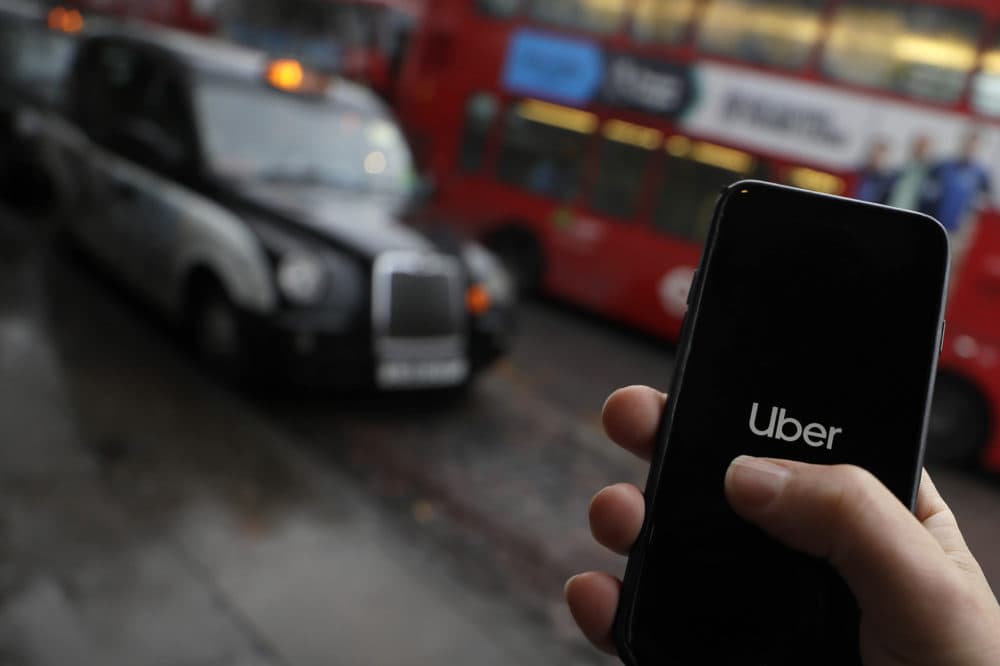Advertisement
Uber Report: Nearly 6,000 Reports Of Sexual Assault Over 2 Years

Uber’s own safety report reveals nearly 6,000 reports of sexual assault in two years. We look at the gig economy’s sexual assault problem and how to fix it.
Guests
Lauren Kaori Gurley, staff writer at Motherboard, the tech vertical for Vice, covering labor and tech. (@LaurenKGurley)
Cindy Southworth, executive vice president at the U.S. National Network to End Domestic Violence. She serves on the safety advisory committee for Uber. Founder of Safety Net Tech Project. (@CindySouthworth)
Alexandrea Ravenelle, professor of sociology at the University of North Carolina at Chapel Hill. Author of "Hustle and Gig: Struggling and Surviving in the Sharing Economy." (@AJRavenelleNYC)
Interview Highlights
On whether gig economy companies should take responsibility for their independent contractors
Alexandrea Ravenelle: “Because these workers are classified as independent contractors, the company is very much able to outsource risk to the workers. They can say it's up to the driver if they want to have a partition or a camera. And they can say that it's the driver's responsibility to pay for these things. They're able to very much outsource the risk, pass the liability over. And it very much leaves workers in a very vulnerable situation. And Uber and Lyft are not the only platforms that are leaving their workers kind of out to dry.”
On how gig economy companies respond to reports of attacks or assaults
Lauren Kaori Gurley: “I think, unfortunately, this is pretty much the status quo. I mean the most of the cases that I've looked at are in lawsuits. ... Often when an assault takes place, someone is intoxicated, or maybe unconscious, or something along those lines. And what goes on is someone's like, ‘Wow, my body feels weird.’ Or someone notices something was weird about what happened. Whether or not they remember the incident or not. And they'll report it to Lyft or Uber. And the responses have been extremely disappointing and disheartening. It's like, you know, they don't hear back. They feel like they're being ghosted. Like they'll reach out and just have someone say, ‘Oh, I'm so sorry this happened to you. I can't believe it. We'll look into it, or we'll deactivate the driver.’ And then they'll never, you know, hear any follow up.
“And I think one of the hard parts for people on both ends is that … they'll promise never to pair a driver or a passenger with the same driver or passenger again. But you could never know if they're being deactivated. So basically what likely happens is they're promising not to match the same people again. But if the same driver [or] passenger is still on the app, what's to make people believe that they're not continuing to assault or harass other passengers or drivers? It doesn't. It's a solution that has made people feel very traumatized and scared to ever go on either of the apps again.”
On the best way for gig economy companies to report a sexual assault to law enforcement
Cindy Southworth: “As a victim advocate, my sort of recommendation to all the companies that I advise is you have to believe survivors, treat them with respect and dignity. Don't retraumatize them, but you have to let the survivor choose the next path. After something horrible, traumatic and invasive has happened to you, you need to decide whether you want the police showing up at your door. So there's been some push to require Uber and Lyft and other companies to report to police without the victim's consent. And I'm like, ‘No, no, no. It has to be what the survivor wants.’ And so what I've recommended for Uber is to say, ‘If you would like to report to law enforcement, we will share all the records. We have a law enforcement response team. We want to help law enforcement.’ But, you know, here is a victim advocate. They're actually starting a partnership with the National Sexual Assault Hotline to connect a victim to a trained victim advocate who can talk through what the survivors’ options are.
“And it's maybe as simple as if you go to the police department, you want to bring a friend with you. If you're going to the hospital, if you have the ability, grab a spare change of clothes because they'll need to keep the ones you are wearing. Things like that are what I've been trained in for 30 years. And it's appropriate for a victim advocate to help a survivor walk through their next steps. So the mandatory law enforcement concept sort of presupposes that law enforcement is the magic solution. And we know from the Brock Turner case, even if the justice system happens — and does get involved in those rare cases, there's enough evidence for an arrest and a prosecution — jail time is abysmally low, and it doesn't get those survivors the sort of justice they were seeking. What many survivors want is somebody removed from the platform: ‘Please keep them off Uber and Lyft so they don't harm someone else.’ And so I believe they're working on making sure they tell victims that the person has been deactivated, because that's something so many survivors crave. They want to know other people are safe.”
Advertisement
On what Uber, Lyft and other gig economy companies can do to prevent assaults
Cindy Southworth: “We really want women to become drivers. We know a lot of survivors of domestic violence want to drive for Uber and Lyft because it's [a] flexible economic option for them where they're trying to get back on their feet. So we need everyone to be safe riders and drivers. One of the things that Uber is doing, beyond their company approach, is partnering with a bunch of nonprofits, like ours, to do the prevention work in communities. Because until we end sexual violence in the broader community, we're not going to be able to end it within the Uber and ride-sharing context. So we are constantly educating the public and having discussions like this with you and your listeners about, ‘How do we end this epidemic of violence?’ And there is a small group of people that may make inappropriate comments that can be educated. So I've had so many taxi drivers ask me if I'm married. And it is terrifying to have somebody ask you that, at midnight in the back of a car, when you're at your house. And I usually lie and say, ‘Yes, and my husband's huge.’
“But that's an educational moment. Somebody might be making small talk and not realizing that makes women uncomfortable. So there's an opportunity to educate and keep somebody as a driver or a rider on the platform. Obviously, any touching you've got to go, like there is no excuse. There's no reason. If somebody passes out in the back of a car, drive to the police department and let the police handle the person. You do not want to be touching someone. So I believe the company is doing a lot. They can do much more and they've got plans to do more. And what I really want people to take away is I want other companies to join in this conversation. We know this is happening everywhere. So please work with the nonprofit experts to figure out how do we end this throughout society.”
From The Reading List
Washington Post: "Uber CEO Q&A: When rape happens in an Uber, who’s responsible?" — "Uber provided many numbers this week when it released its first-ever safety report, tallying thousands of incidents of sexual assault and death among its drivers and passengers.
"Now come the questions the 84-page report didn’t answer.
"Chief executive Dara Khosrowshahi sat down with me in Uber’s San Francisco headquarters to follow up on an interview last year in which he told me safety was his No. 1 priority. We spoke this time about what he’s learned — and what Uber’s responsibility is for the very real-world impact of its business.
"When someone gets raped in an Uber, what are Uber’s obligations? Khosrowshahi’s answers have it both ways. Uber is working hard — leading the entire industry, he says — to reduce the rate of assaults to as close to zero as possible. And it’s the first company to bring this level of transparency to the problem."
Los Angeles Times: "Uber’s report on sexual assaults and accidents offers some answers, more questions" — "With the publication this week of its first safety transparency report, Uber offers the clearest look yet into the dangers of its platform. But it also establishes a baseline from which the ride-hailing giant must improve.
"Uber‘s long-awaited safety disclosure took the form of an 84-page report, which reveals that in 2017 and 2018 there were 107 deaths during traffic accidents, nearly 6,000 total reports of sexual assault and 19 fatal physical assaults. The company committed to publishing this data in May 2018 in response to a series of sexual assault claims.
"The report, which the company says took 21 months to compile and audit, is the first of its kind in the ride-hailing industry. Until now, Uber and its primary competitor, Lyft, have declined to provide a look at the numbers of assault or misconduct complaints. The company is calling on others to join in publishing such data, going as far as providing its methodology and committing to releasing updated numbers every two years."
Vox: "It’s not just passengers being assaulted in Ubers. Drivers are at risk, too." — "More than 3,000 people were sexually assaulted during Uber rides last year.
"The disturbing numbers, released by the company on Thursday, have many concerned about the safety of using Uber and other rideshare apps — especially since the data came out the same week that 19 women sued Lyft, saying drivers for the company sexually assaulted them.
"But it’s not just passengers who are being assaulted. According to Uber’s data, 42 percent of those reporting sexual assault were drivers. 'Drivers are assaulted as much as the passengers are,' Michael Bomberger, an attorney who represents the women suing Lyft, told Vox.
"Passengers may be more vulnerable to certain types of assault. For example, Bomberger said he has heard from multiple riders who fell asleep in an Uber or Lyft and woke up to find a driver attacking them. And 92 percent of people who experienced sexual assault involving penetration were passengers, according to reports to Uber.
"But drivers — especially the roughly 19 percent of Uber drivers and 30 percent of Lyft drivers who are women — often report being groped by passengers, Bomberger said. And since they are independent contractors for gig-economy companies, they lack some of the protections available to taxi drivers and other workers, like partitions separating them from passengers."
This program aired on December 11, 2019.

